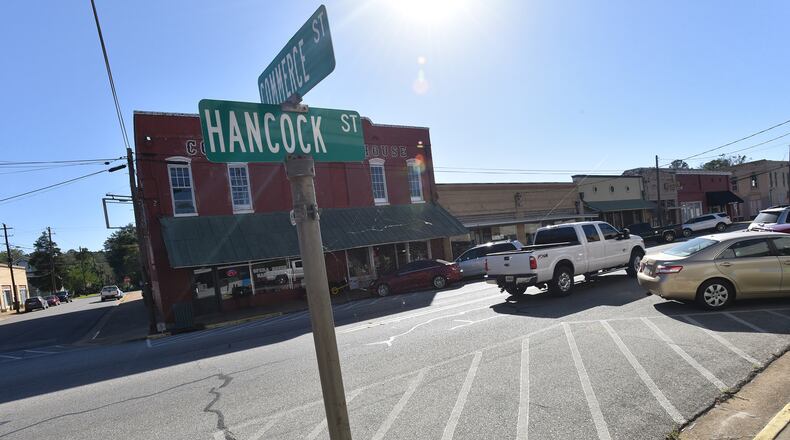Legislative leaders are pouring more than $40 million into new or expanded programs aimed specifically at helping the economy of small-town Georgia.
Fixing some of the economic ills that plague rural Georgia was always going to be a major theme of the 2018 General Assembly session after both chambers committed to dozens of hearings across the state last year to find out what they could do.
Many leaders of key committees in the House and Senate live in rural areas and are keenly aware of the struggles facing much of nonmetro Georgia.
State House Appropriations Chairman Terry England, R-Auburn, a co-chairman of the House Rural Development Council, said the new state spending, along with some legislation working its way through the General Assembly, hopefully will start addressing the area's long-running problems.
“There is no simple way to crack the nut,” England said, “but you have to find ways to start cracking the nut.”
The efforts are focused on counties losing population and jobs to cities, leaving behind areas with few prospects for economic growth. Of Georgia’s 159 counties, 124 of them had less than 5 percent population growth for five straight years.
Rural hospitals have closed, many school systems have struggled to provide the kind of education metro Atlanta children take for granted, and access to high-speed internet has often been lacking.
"The plight of rural Georgia has grown to such dimensions, and there is so much Republican leadership in rural Georgia saying, 'Give us a hand, boys,' " said state Sen. Nan Orrock, D-Atlanta. "I think we are working overtime to look at remedies and solutions for rural Georgia."
Gov. Nathan Deal and lawmakers included almost $26 million in the midyear budget, which runs through June 30, to lengthen runways at 13 rural airports. Deal and lawmakers hope rural airport improvements will give locals another selling point when trying to attract businesses.
Both chambers have also backed funding for a Rural Center for Health Care Innovation and Sustainability and for a Center for Rural Prosperity and Innovations, likely to be housed at one of the state's universities in South Georgia.
In the budget for the upcoming year, which begins July 1, the House added money to increase payments to hospitals handling triage cases — with rural hospitals getting a bigger supplement than urban ones — and to have a residency recruitment fair in hopes of attracting more doctors to small-town Georgia.
Both chambers backed money to hold a similar fair this year.
The House added $738,000 to the budget for a rural development program in the Georgia Department of Economic Development, $642,000 for a mobile audiology clinic for rural schoolchildren, $325,000 to increase marketing of Georgia-grown farm products, $227,000 for character education programs in low-performing rural schools, $150,000 for two rural surgical fellowships and $130,000 to hire an attorney to work on downtown development projects.
The Senate, which had its own committee studying the issue, will likely add more money when it comes out with its version of the spending plan for the upcoming year to show its support for helping rural Georgia.
"It's not something you want to be against," said state Senate Appropriations Chairman Jack Hill, R-Reidsville. "Even the folks in the cities say we need to make a good old-fashioned effort at it. This is what happens when you get out and ask people what they need."
Nonbudget legislative remedies have been more hit and miss.
The House rural panel wanted to provide generous tax breaks to individuals and families who move to rural areas. The idea went nowhere.
A proposal to tax internet services such as Netflix, e-books and music downloads to help subsidize bringing high-speed internet access to rural areas stalled a few weeks after it was introduced.
Bills still pending in the Georgia General Assembly would allow local electric membership cooperatives to offer internet services, set up a system for communities to receive future internet expansion subsidies and permit 5G wireless technology on public rights of way.
Other rural-focused legislation would allow for "micro-hospitals" in small communities and would increase the value of tax credits for Georgians who donate to small-town hospitals. The current tax credit program has not done as well as lawmakers expected.
Orrock said after spending much of the past year holding public hearings and meetings across the state, it’s no surprise that lawmakers are determined to try to begin addressing the problems of rural Georgia.
“There were task forces, studies, this and that. … You could say there are countless initiatives that have jumped up on the radar screen this legislative session, and rural is the watchword,” Orrock said. “Your (legislative) leadership would be highly in question if they let half the state go under.”
IMPORTANT STORY HIGHLIGHTS
- 124 Georgia counties had less than 5 percent population growth for five straight years.
- The midyear budget that runs though June 30 adds $26 million to lengthen runways at 13 rural airports.
- New legislation would allow for "micro-hospitals" in small communities.
- $325,000 to increase marketing of Georgia-grown farm products.
Never miss a minute of what's happening in Georgia Politics. Subscribe to PoliticallyGeorgia.com.
About the Author
Keep Reading
The Latest
Featured




